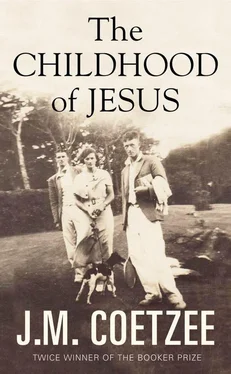‘What is a windmill?’ asks the boy.
‘Look at the picture. Those big arms are the four sails of the windmill. As the sails spin in the wind, they turn the wheel, and the wheel turns a big stone inside the mill, called a millstone, and the millstone grinds wheat into flour so that the baker can bake bread for us to eat.’
‘But it isn’t really a windmill, is it?’ says the boy. ‘Go on.’
‘ A windmill may be what you see, Sancho , said Don Quixote, but that is only because you have been enchanted by the sorceress Maladuta. If your eyes were unclouded, you would see a giant with four arms bestriding the road . Do you want to know what a sorceress is?’
‘I know about sorceresses. Go on.’
‘With these words Don Quixote couched his lance and clapped his spurs to the flanks of Rocinante and charged at the giant. With one of his four fists the giant easily parried Don Quixote’s lance. Ha ha ha, poor ragged knight , he laughed, do you really believe you can best me?
‘Then Don Quixote unsheathed his sword and charged again. But just as easily, with his second fist, the giant smote the sword aside, together with the knight and his steed.
‘Rocinante struggled to her feet, but as for Don Quixote, he had suffered such a blow to the head that he was quite dizzy. Alas, Sancho , said Don Quixote, unless some healing balm shall be applied to my wounds by the hand of my mistress the fair Dulcinea, I fear I will not live to see another dawn . — Nonsense, your honour , replied Sancho, it is only a bump on the head, you will be right as rain as soon as I get you away from this windmill . — Not a windmill but a giant, Sancho , said Don Quixote. — As soon as I get you away from this giant , said Sancho.’
‘Why doesn’t Sancho also fight the giant?’ asks the boy.
‘Because Sancho is not a knight. He is not a knight, therefore he has no sword or lance, just a pocketknife for peeling potatoes. All he can do — as we will see tomorrow — is to load Don Quixote onto his donkey and convey him to the nearest inn to rest and recover.’
‘But why doesn’t Sancho hit the giant?’
‘Because Sancho knows the giant is really a windmill, and you can’t fight against a windmill. A windmill is not a living thing.’
‘He’s not a windmill, he’s a giant! He’s only a windmill in the picture.’
He puts down the book. ‘David,’ he says, ‘ Don Quixote is an unusual book. To the lady in the library who lent it to us it looks like a simple book for children, but in truth it isn’t simple at all. It presents the world to us through two pairs of eyes, Don Quixote’s eyes and Sancho’s eyes. To Don Quixote, it is a giant he is fighting. To Sancho, it is a windmill. Most of us — not you, perhaps, but most of us nevertheless — will agree with Sancho that it is a windmill. That includes the artist who drew a picture of a windmill. But it also includes the man who wrote the book.’
‘Who wrote the book?’
‘A man named Benengeli.’
‘Does he live in the library?’
‘I don’t think so. It is not impossible, but I would say it is unlikely. I certainly haven’t noticed him there. He would be easy to recognize. He wears a long robe and has a turban on his head. ‘
‘Why are we reading Bengeli’s book?’
‘Benengeli. Because I came across it in the library. Because I thought you might enjoy it. Because it will be good for your Spanish. What else do you want to know?’
The boy is silent.
‘Let us stop there and go on tomorrow with the next adventure of Don Quixote and Sancho. By tomorrow I will expect you to be able to point out Sancho with the big S and Don Quixote with the curly Q .’
‘It’s not the adventures of Don Quixote and Sancho. It’s the adventures of Don Quixote.’
One of the larger freighters has arrived at the docks, what Álvaro calls a double-belly freighter, with holds fore and aft. The dockers split into two crews. He, Simón, joins the fore crew.
At mid-morning on the first day of the unloading, down in the hold, he hears commotion on the deck and the shrilling of a whistle. ‘That’s the fire signal,’ says one of his companions. ‘Let’s get out quick!’
He smells smoke even as they scramble up the ladder. It comes billowing up from the aft hold. ‘All out!’ bellows Álvaro from his position on the bridge beside the ship’s master. ‘All ashore!’
No sooner have the stevedores hauled up their ladders than the ship’s crew drag the huge hatch covers to.
‘Aren’t they going to put out the fire?’ he asks.
‘They are starving it,’ replies his companion. ‘In an hour or two it will be dead. But the cargo will be ruined, no doubt about that. We may as well dump it to the fishes.’
The stevedores gather on the quayside. Álvaro begins to call the roll. ‘Adriano. . Agustín. . Alexandre. .’ ‘Here. . Here. . Here. .’ come the responses. Until he reaches Marciano. ‘Marciano. .’ Silence. ‘Has anyone seen Marciano?’ Silence. From the sealed hatch a wisp of smoke drifts into the windless air.
The sailors drag the hatch covers off again. At once they are enveloped in dense grey smoke. ‘Close up!’ commands the ship’s master; and to Álvaro, ‘If your man is there, it’s all up with him.’
‘We are not abandoning him,’ says Álvaro. ‘I will go down.’
‘Not while I am in command you won’t.’
At noon the aft hatch covers are briefly reopened. The smoke is as thick as ever. The captain orders the hold to be flooded. The dockers are dismissed.
He recounts the day’s events to Inés. ‘As for Marciano, we won’t know for sure until they pump the hold dry in the morning,’ he says.
‘What won’t you know about Marciano? What happened to him?’ asks the boy, coming in on the conversation.
‘My guess is that he fell asleep. He was careless and breathed in too much smoke. If you take in too much smoke you grow weak and dizzy and fall asleep.’
‘And then?’
‘Then I am afraid to say you don’t wake up in this life.’
‘Do you die?’
‘Yes, you die.’
‘If he died he will go on to the next life,’ says Inés. ‘So there is no need to be worried about him. It is time for your bath. Come on.’
‘Can Simón give me my bath?’
He has not seen the boy naked in a long time. He notes with pleasure how his body is filling out.
‘Stand up,’ he says, and rinses the last of the soap off him and wraps him in a towel. ‘Let us dry you quickly, then you can put on your pyjamas.’
‘No,’ says the boy. ‘I want Inés to dry me.’
‘He wants you to dry him,’ he reports to Inés. ‘I am not good enough.’
Stretched out on his bed, the boy allows Inés to attend to him, drying between his toes, in the crack between his legs. His thumb is in his mouth; his eyes, drugged with omnipotent pleasure, follow her lazily.
She dusts him with talcum powder as if he were a baby; she helps him into his pyjamas.
It is time for bed, but he will not let go of the story of Marciano. ‘Maybe he isn’t dead,’ he says. ‘Can we go and look, Inés and you and I? I won’t breathe in any smoke, I promise. Can we?’
‘There is no point in that, David. It is too late to save Marciano. And the ship’s hold is full of water anyway.’
‘It’s not too late! I can swim down into the water and save him, like a seal. I can swim anywhere. I told you, I am an escape artist.’
‘No, my boy, swimming down into a flooded hold is too dangerous, even for an escape artist. You could get trapped and never come back. Besides, escape artists don’t save other people, they save themselves. And you aren’t a seal. You haven’t learned how to swim. It is time you understood one doesn’t get to swim or be an escape artist just by wishing so. It takes years of training. Anyhow, Marciano doesn’t want to be saved, to be brought back to this life. Marciano has found peace. He is probably crossing the seas at this very moment, looking forward to the next life. It will be a great adventure for him, to start anew, washed clean. He won’t have to be a stevedore any more, and carry heavy bags on his shoulders. He can be a bird. He can be anything he likes.’
Читать дальше












